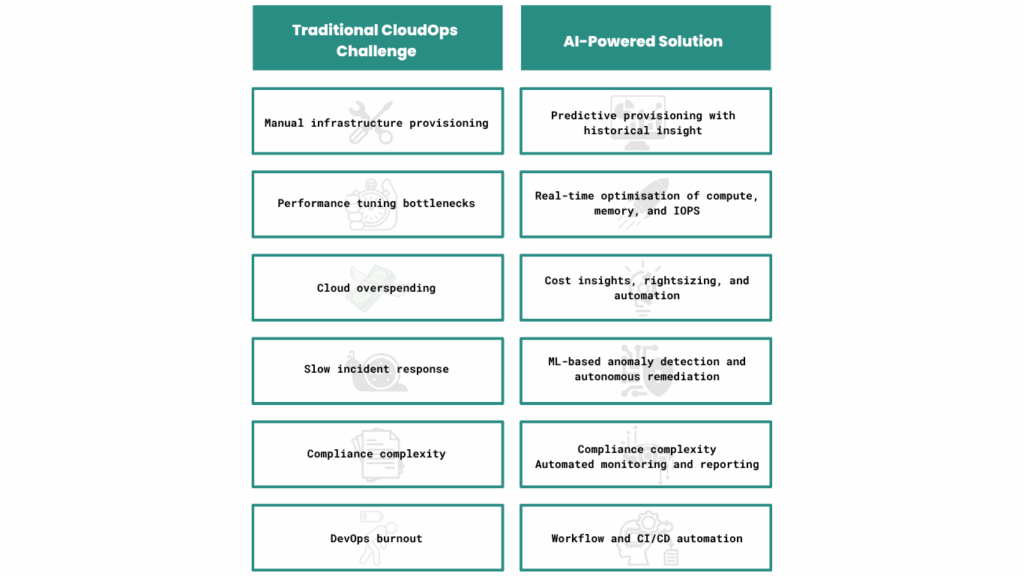Work Hours
Monday to Friday: 10.00 - 19.00
Introduction: The Future of Enterprise Operations
The integration of Artificial Intelligence (AI) and cloud computing, specifically AI in Cloud Data Operations, has rapidly evolved from optional upgrades into essential infrastructure for modern businesses. Separately, they each offer scalability and intelligence. Together, they create an exponentially more powerful system for automating, optimising, and accelerating cloud-native operations.
Enterprises today face enormous data volumes, distributed systems, and real-time demands. Manual oversight is no longer viable. Through AI in cloud data operations, infrastructure shifts from reactive firefighting to predictive, autonomous management, boosting uptime, performance, and ROI.
At TardiTech, we’ve observed this shift firsthand, helping enterprises leverage AI to move beyond reactive cloud management to a truly proactive and intelligent operational model.
Let’s explore how AI transforms cloud operations across automation, cost control, observability, scalability, and governance.
Core Benefits of AI in Cloud Data Operations
Intelligent Automation of Cloud Workflows
AI enables the automation of repetitive and complex infrastructure tasks, including:
- AI-powered resource provisioning for Cloud operations
- Predictive backup scheduling based on usage patterns
- Automated software patching and updates with cloud AI
- Dynamic resource allocation based on demand forecasts
Beyond infrastructure tasks, cloud AI enables scalable deployment of intelligent services like natural language processing (NLP), computer vision, and predictive modelling. This lets organisations automate workflows such as document classification, sentiment analysis, and visual inspection, reducing manual labour and improving accuracy.
Instead of relying on static rules or human input, AI models dynamically adjust cloud operations to optimise for real-world conditions. For instance, AI can detect high-demand patterns during peak sales seasons and automatically scale infrastructure in advance.
Real-Time Performance Monitoring and Self-Healing Systems
AI enables real-time observability across multiple cloud layers. Machine learning algorithms can:
-
Spot anomalies in CPU, memory, and network
-
Identify patterns leading to potential system failures
-
Trigger self-healing actions (e.g., restarting services, redirecting traffic)
This minimises Mean Time to Detect (MTTD) and Mean Time to Resolution (MTTR), reducing service disruptions and keeping services online seamlessly.
AI-Driven Predictive and Autonomous Scaling in Cloud Data Operations
Unlike traditional autoscaling, which reacts after thresholds are breached, AI models predict usage trends based on historical data and external signals (e.g., marketing campaigns, and user behaviour).
This ensures:
- Resources are provisioned before demand spikes
- Services remain responsive under high load
- No over-reliance on costly manual interventions
Effective cost control and spend management is a major cloud operations challenges. AI enhances financial control across cloud environments through:
- Continuous cost monitoring and anomaly detection in real-time
- Automated shutdown of idle or underutilised resources
- Smart instance recommendations, including reserved vs. on-demand tradeoffs
- Spending forecasting based on historical usage and predictive analysis
According to StackRoute, AI-led CloudOps can cut infrastructure costs by 20–40%. AI not only reduces waste but also empowers teams with actionable insights.
AI improves cloud security through:
- Pattern recognition to detect breaches or insider threats
- Adaptive access controls that evolve with user behaviour
- Real-time alerting for unusual activity
- Automatic remediation workflows
However, integrating AI in the cloud isn’t without risks. Managing sensitive data in training models raises privacy concerns, especially in regulated industries. Consolidating datasets from disparate systems and enforcing consistent access controls can also introduce integration complexity that must be carefully managed. For compliance-heavy industries, AI simplifies audits by auto-generating logs, mapping data flows, and ensuring encryption standards are continuously enforced.
Empowering DevOps Teams through AI Automation
AI helps prevent DevOps burnout by taking over repetitive, low-value tasks:
- Automated CI/CD pipeline testing and rollbacks
- Configuration drift detection
- Workflow orchestration for incident response
With AI handling repetitive tasks, DevOps teams avoid burnout and reduce human error. This creates a faster, cleaner feedback loop for deployments and innovation.
Challenges in Traditional CloudOps (And How AI Fixes Them)

Industry Use Cases: Where AI + Cloud is Driving Real Impact
E-Commerce
To maintain performance and maximise expenditure, AI anticipates demand spikes (such as Black Friday sales) and proactively scales infrastructure.
Finance
Cloud-native data pipelines integrate with machine learning algorithms to instantly detect and flag fraudulent transaction patterns.
Healthcare
AI streamlines medical image processing workflows in cloud environments, accelerating diagnoses while ensuring compliance (HIPAA, GDPR).
Media & Entertainment
Video content is automatically transcoded, compressed, and distributed by AI according to device type and geographical demand.
SaaS & Startups
Businesses may utilise AI to auto-scale containers, lower CI/CD pipeline latency, and facilitate quicker product iterations without expanding engineering teams.
These companies also benefit from cognitive cloud services, like intelligent search, document understanding, and virtual assistants, that boost customer experience without expanding infrastructure.
Strategic Business Advantages of AI-Powered CloudOps
Operational Efficiency
Less manual work means faster deployments, fewer outages, and higher team productivity.
Cost Transparency
With real-time insights and smart recommendations, finance teams gain visibility and control over cloud spending.
Reduced Downtime
AI prevents issues before they occur, increasing customer satisfaction and confidence.
Competitive Agility
Companies using AI-powered cloud infrastructure can launch features faster, adapt to market changes, and scale globally.
Enhanced Talent Retention
By eliminating repetitive DevOps tasks, teams can focus on high-impact, engaging work, improving morale and retention.
“Cloud AI platforms now support everything from NLP and vision to full machine-learning pipelines, letting teams automate complex workflows at scale”

The Future of AI in Cloud Data Operations
Adaptive Platforms
AI-native platforms will emerge that treat cloud operations as adaptive systems, capable of learning and evolving without human instruction.
Federated AI for Multi-Cloud Governance
Future AI will coordinate compliance and performance across multiple cloud providers, making true multi-cloud orchestration seamless.
Environmental Optimisation
AI will not only optimise cost and performance but also minimise carbon impact by selecting low-emission regions and workloads.
AI Co-Pilots for Ops
Integrated assistants will guide cloud engineers with intelligent suggestions, real-time alerts, and automated scripting for remediation.
Edge + Cloud AI Architectures
To support low-latency processing for real-time applications like IoT and autonomous systems, organisations are adopting hybrid edge-cloud AI architectures. These systems process data closer to the source (edge) while offloading heavy tasks to the cloud, reducing bandwidth usage and improving response times.
Market Outlook: The global cloud-AI market is projected to reach $647.6 billion by 2030, growing at a compound annual rate of 39.7% from 2025. This explosive growth underscores the urgency for enterprises to invest in AI-enabled CloudOps now to remain competitive.
Final Thoughts: Your Next Step Toward Smart CloudOps
AI in Cloud Data Operations is no longer a future concept; it’s today’s competitive advantage.
From reducing spend and increasing uptime to empowering teams and ensuring compliance, the benefits are measurable and mission-critical.
TardiTech, enables this transformation, whether you’re a high-performance SaaS or a global enterprise, we tailor CloudOps powered by AI for your unique needs.
The future of cloud operations is here, and it’s powered by AI. Don’t get left behind.
Ready to Unlock AI-Powered Efficiency?
If your cloud setup feels reactive, costly, or hard to scale, let’s change that. Book a quick consult, and we’ll show you exactly where AI can help you cut spend, boost performance, and take the pressure off your DevOps team.
Ready to run smarter, leaner cloud operations? Let’s talk.


